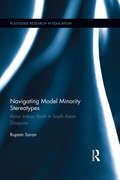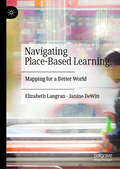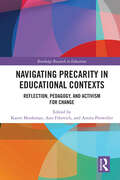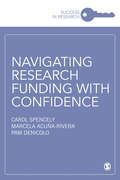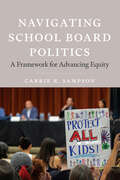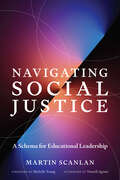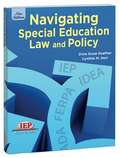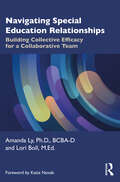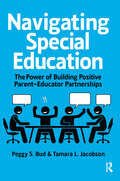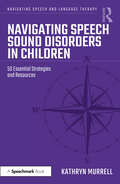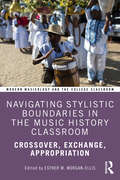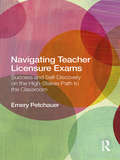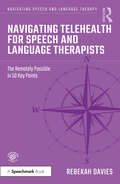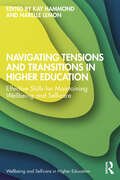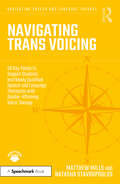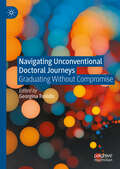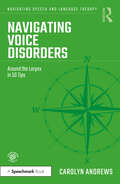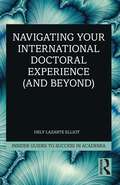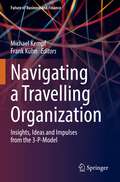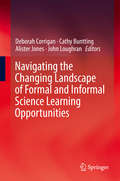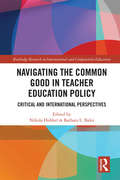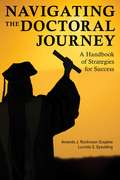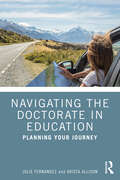- Table View
- List View
Navigating Model Minority Stereotypes: Asian Indian Youth in South Asian Diaspora (Routledge Research in Education #146)
by Rupam SaranThough Asian Indians are typically thought of as a "model minority", not much is known about the school experiences of their children. Positive stereotyping of these immigrants and their children often masks educational needs and issues, creates class divides within the Indian-American community, and triggers stress for many Asian Indian students. This volume examines second generation (America-born) and 1.5 generation (foreign-born) Asian Indians as they try to balance peer culture, home life and academics. It explores how, through the acculturation process, these children either take advantage of this positive stereotype or refute their stereotyped ethnic image and move to downward mobility. Focusing on migrant experiences of the Indian diasporas in the United States, this volume brings attention to highly motivated Asian Indian students who are overlooked because of their cultural dispositions and outlooks on schooling, and those students who are more likely to underachieve. It highlights the assimilation of Asian Indian students in mainstream society and their understandings of Americanization, social inequality, diversity and multiculturalism.
Navigating Place-Based Learning: Mapping for a Better World
by Elizabeth Langran Janine DeWittThis book explores how educators can realize the potential of critical place-based pedagogy. The authors’ model leverages the power of technology through strategies such as mobile mapping so that students can read the world and share spatial narratives. The same complexity that makes spaces outside the classroom ideal for authentic, purposeful learning creates challenges for educators who must minimize students taking wrong turns or reaching dead ends. Instructional design process is key and the authors offer exemplars of this from multiple disciplines. Whether students are exploring a local community or a natural environment, place-based inquires must include recognition of privilege and the social dynamics that reinforce inequalities. Concluding with a discussion of the changing social context, the authors highlight how contemporary events add a sense of urgency to the call for a critical place-based pedagogy—one that is more inclusive for all students.
Navigating Precarity in Educational Contexts: Reflection, Pedagogy, and Activism for Change (Routledge Research in Education)
by Karen Monkman Ann Frkovich Amira ProwellerThis volume offers a timely collection of research-based studies that engage with contemporary conditions of precarity across an array of locations, exploring how it is understood, experienced, and acted upon by educators in schools, universities, and nonformal educational spaces. Precarity presents as layered, unpredictable, destabilizing, and rapidly shifting socio-political and economic dynamics, shown here in various forms, including the global pandemic, divisive populist politics, displacement of refugees and the landless, race and gender injustices, and neoliberal policies that constrain educational and social possibilities. Grouped around reflection, educational practice, and social activism, the authors show how educators engage these precarious conditions as they work toward a more interconnected, humane, and just society. This text will benefit researchers, academics, and educators with an interest in social foundations of education, multicultural and social justice education, educational policy, and international and comparative education, sociology and anthropology of education, and cultural studies within education, among other fields.
Navigating Research Funding with Confidence (Success in Research)
by Pam Denicolo Carol Spencely Marcela Acuna-RiveraA timely manual in the current climate of increasingly underfunded departments and institutions, this book offers insight into how to secure, manage and effectively research funding in the changing order of global economy and competing research priorities. It gives you the perspectives of those who seek, and those who award research funding, such as governments, companies and foundations. Examining the full cycle and elements of influence of research funding, this book comes with: • Practical case studies, • Lists of potential funding sources that you can use to enhance your funding generation efforts, and • Explanatory videos Clear and digestible, this text delivers systematic guidance for early career researchers and students in Graduate Schools, Doctoral Colleges, Research Methods Programmes, Academic and Research Staff Development Programmes.
Navigating Ruptures, Repairs, and Termination Within the Therapeutic Process
by Judy Z. KoenigsbergThis book explores the importance of the therapeutic relationship, the tensions or disagreements that may emerge during a therapy session, and how they can be repaired.Dr. Koenigsberg introduces a two-part transtheoretical, psycholinguistic model which focuses on the connection between ruptures and the termination phase of therapy, emphasizing the verbal and nonverbal nuances of language, to understand what is happening in the therapeutic alliance. With a reliance on psycholinguistic elements, this model can guide therapists who wish to reduce the premature termination of patients from therapy. Written in an accessible format, it provides case examples, including the patient’s and therapist’s inner experiences, and defines and describes the phases of therapy so that difficult transitions in the therapeutic process can be navigated with skill and compassion.This text is essential for providing early career as well as more seasoned therapists with excellent strategies to repair their therapeutic relationships with clients.
Navigating School Board Politics: A Framework for Advancing Equity (Race and Education)
by Carrie SampsonA visionary overview of the political role of publicly elected school boards and a proactive take on the work they can accomplish toward social justice
Navigating Social Justice: A Schema for Educational Leadership
by Martin ScanlanA highly accessible and easily adaptable conceptual framework that helps educational leaders plan, leverage, and sustain change as they create more equitable schools. In Navigating Social Justice, Martin Scanlan introduces a comprehensive social justice schema that melds organizational learning with leading for equity. Scanlan distills wisdom gleaned from the experiences of a variety of educational professionals as well as from his own more than three decades of work in equity-focused partnership with elementary schools. Scanlan&’s schema brings together five dimensions—inclusivity, communities of practice, critical formation, social ecosystems, and practical wisdom—that work together holistically to eradicate inequitable practices and policies and promote robust teaching and inclusive learning. For each dimension, the book features real-life vignettes that focus the conversation, exercises that encourage reflection, and suggested opportunities for the application of its central ideas. Each chapter also gives access to online tools, extending its utility. The practical guidance offered in this book not only will enable educational institutions to best meet the needs of families and community members but will also help leaders cultivate the moral and intellectual judgment needed to address social justice issues in schools. This clarifying equity framework will be invaluable to established and aspiring school leaders, building administrators, district leaders, system administrators, and others in both the public and private education sectors as they engage in ongoing social justice work.
Navigating Special Ed Law And Policy
by Attainment CompanyA comprehensive guide to special education rights and responsibilities.The right of students with disabilities not to be discriminated against while receiving an appropriate education resulted from intense political lobbying and lawsuits in the 60s and 70s. But where are we at today? Navigating Special Education Law and Policy looks at our progress and addresses these rights and responsibilities of teachers, administrators, support staff and parents toward our children with disabilities.
Navigating Special Education Relationships: Building Collective Efficacy for a Collaborative Team
by Amanda Ly Lori BollTold through a series of real-life stories and hard-learned lessons, Amanda Ly and Lori Boll share the challenges in special education relationships experienced through the lens of a special educator, a parent of a son with profound disabilities, and a child psychologist.Ideally, teachers, therapists, and parents working with students with special needs should form a cohesive team. However, these three parties often function as separate entities with different goals and objectives. Over the past 25 years, the authors have observed a consistent pattern of miscommunication and overlooking the importance of the mental and physical well-being of each team member, which contributed to poor collaboration. This book takes readers on a journey through the process of discovering whether you have, or are working with, a student with special needs; navigating how to best work with the student and other members of the team; and lastly, discussing ways to empower the reader and all members of the team. The authors posit that if we understand one another's perspectives, learn how to communicate more effectively, and focus on self-care, we will increase Collective Efficacy and become the collaborative team our students need us to be.As the first book to connect the concept of Collective Efficacy to special education, this is a must-read for teachers, therapists, and parents aiming to grasp the complexities of relationships in special education teams and better understand how mental health influences the effectiveness of each individual’s role.
Navigating Special Education: The Power of Building Positive Parent-Educator Partnerships
by Peggy Bud Tamara JacobsonThis timely and innovative roadmap for parents, educators, and administrators highlights the importance of effective communication methodology, appropriate correspondence, and data collection recommendations. Effective communication is often missing from the IEP team’s conversation. Navigating Special Education provides a foundation for building proactive, positive partnerships that will lead to 21st century best practices for children.The 5-C Model of Communication—Conversation, Collaboration, Cooperation, Compromise, and Consensus—presented in Navigating Special Education helps to forge trusted alliances between school districts and families.Navigating Special Education draws upon the authors’ 60-plus years of combined experience by using: Anecdotal, evidence-based, real-life scenarios Templates for letter writing and extensive data collection A user-friendly appendix and glossary As stakeholders, wouldn’t you like to have successful meetings where everyone’s voice is heard, respected, and understood? After reading Navigating Special Education, families, educational professionals, college students, and special education organizations will be able to implement effective models of communication and build positive partnerships.
Navigating Special Education: The Power of Building Positive Parent-Educator Partnerships
by Peggy S. Bud Tamara L. JacobsonThis timely and innovative roadmap for parents, educators, and administrators highlights the importance of effective communication methodology, appropriate correspondence, and data collection recommendations. Effective communication is often missing from the IEP team’s conversation. Navigating Special Education provides a foundation for building proactive, positive partnerships that will lead to 21st century best practices for children. <p><p>The 5-C Model of Communication—Conversation, Collaboration, Cooperation, Compromise, and Consensus—presented in Navigating Special Education helps to forge trusted alliances between school districts and families. <p><p>Navigating Special Education draws upon the authors’ 60-plus years of combined experience by using: Anecdotal, evidence-based, real-life scenarios. Templates for letter writing and extensive data collection. A user-friendly appendix and glossary. <p><p>As stakeholders, wouldn’t you like to have successful meetings where everyone’s voice is heard, respected, and understood? After reading Navigating Special Education, families, educational professionals, college students, and special education organizations will be able to implement effective models of communication and build positive partnerships.
Navigating Speech Sound Disorders in Children: 50 Essential Strategies and Resources (Navigating Speech and Language Therapy)
by Kathryn MurrellNavigating Speech Sound Disorders in Children is an easy-to-read resource which gives an overview of the whole area of speech sound disorders (SSDs) in children, covering assessment, diagnosis, treatment, and management, underpinned by the latest research in the field.The book focuses on key information, providing helpful therapy tips and evidence-based, practical advice drawing on clinical research and the author’s extensive experience. Presented in 50 bite-sized chunks, therapists can find and refer to information quickly and easily. Additional guidance and links to further reading are signposted throughout so that the reader can explore topics in more detail, and a wealth of case examples is included to illustrate each point and demonstrate real-life application.Written by a specialist in the field, this book provides strategies for students and qualified speech and language therapists (SALTs) working with children who present with many different types of SSD. It is valuable reading for both students and less experienced speech and language therapists, as well as seasoned clinicians.
Navigating Stylistic Boundaries in the Music History Classroom: Crossover, Exchange, Appropriation (Modern Musicology and the College Classroom)
by Esther M. Morgan-EllisAt a time of transformation in the music history classroom and amid increasing calls to teach a global music history, Navigating Stylistic Boundaries in the Music History Classroom adds nuance to the teaching of varied musical traditions by examining the places where they intersect and the issues of musical exchange and appropriation that these intersections raise. Troubling traditional boundaries of genre and style, this collection of essays helps instructors to denaturalize the framework of Western art music and invite students to engage with other traditions—vernacular, popular, and non-Western—on their own terms.The book draws together contributions by a wide range of active scholars and educators to investigate the teaching of music history around cases of stylistic borders, exploring the places where different practices of music and values intersect. Each chapter in this collection considers a specific case in which an artist or community engages in what might be termed musical crossover, exchange, or appropriation and delves deeper into these concepts to explore questions of how musical meaning changes in moving across worlds of practice. Addressing works that are already widely taught but presenting new ways to understand and interpret them, this volume enables instructors to enrich the perspectives on music history that they present and to take on the challenge of teaching a more global music history without flattening the differences between traditions.
Navigating Teacher Licensure Exams: Success and Self-Discovery on the High-Stakes Path to the Classroom
by Emery PetchauerNavigating Teacher Licensure Exams offers practical, empirically sourced insights into the high-stakes licensure exams required in most states for teacher certification. This unique resource foregrounds the experiences of diverse preservice teachers, including teachers of color, to understand how they organize their preparation efforts, overcome self-doubt and anxiety, and navigate the high-pressure space of this important testing event. By situating these exams within their social and psychological contexts, presenting real-life cases of success and failure, and confronting innate perceptions of standardized tests, this book provides essential and highly practical support for preservice teachers, teacher educators, and departmental resource libraries.
Navigating Telehealth for Speech and Language Therapists: The Remotely Possible in 50 Key Points (Navigating Speech and Language Therapy)
by Rebekah DaviesThere is so much to consider in any clinical consultation: identifying the individual is the one you expected, who is with the individual, which therapy intervention, resources, signposting, referrals, being cued in to responses for contextual information, evaluation and outcomes, planning next steps … and this is all before you throw ‘virtual’ in the mix! This clinical companion presents 50 transferable, adaptable, practical and accessible chapters for speech and language therapists and others working via remote consultations. Divided into four sections, the book covers: The remote practitioner. The remote rules. Creating a digital tool kit. A remotely possible future. Aimed at students encountering their first remote consultations, newly qualified clinicians with limited practical experience of virtual clinics through to clinicians who are experienced in their own specialities but now need to transfer those skills to remote ways of delivery, this concise text will provide confidence and guidance for the reader. It will also prove useful to clinicians beyond speech and language as many of the skills and practical advice and guidance are applicable in specialities across a range of settings, both public and private, healthcare and education.
Navigating Tensions and Transitions in Higher Education: Effective Skills for Maintaining Wellbeing and Self-care (Wellbeing and Self-care in Higher Education)
by Narelle Lemon Kay HammondWith a focus on skills development, this book provides guidance on how to navigate transitions between career stages in higher education and how to maintain wellbeing in the process.In a fast-paced and ever-changing environment, a career path in higher education can demand rapid transition. This book provides comprehensive coverage of the kinds of transitions one may face in higher education and how to navigate them successfully while focusing on wellbeing and self-care. Centred around first-person accounts, the chapters illustrate the key issues around transitions and their impacts and provide suggestions for how to adapt through self-care. The authors offer insights from their own personal experiences, enabling the reader to develop an action plan of their own or to share with and guide students and early career mentees. The tools and strategies outlined in the book make up a library of resources that can be called upon at any stage of the journey.Written with all career stages in mind, this book will be an essential resource for new and experienced researchers alike.
Navigating Trans Voicing: 50 Key Points to Support Students and Newly Qualified Speech and Language Therapists with Gender-Affirming Voice Therapy (Navigating Speech and Language Therapy)
by Matthew Mills Natasha StavropoulosThis book is a resource for those new to the field of trans voicing. It summarises 50 key points needed to work collaboratively and effectively with trans and non-binary people, covering sections on: Trans cultural knowledge, sensitivity and awareness Vocal pedagogy and the therapeutic relationship Fundamental know-how and voice therapy principles and exercises in trans voicing Written and developed by both a leading consultant speech and language therapist in trans voicing, and a psychologist and counsellor from the trans community, the book centres a unique collaboration of clinical and lived experience expertise and is deeply trans-affirmative in approach.
Navigating Unconventional Doctoral Journeys: Graduating Without Compromise
by Georgina TsolidisThis edited book delves into the experiences of a group of women who, as mature aged students, took on doctoral studies, persevered and succeeded. Drawing on their own experiences, the group of women from varied backgrounds consider, with hindsight, what prompted them to begin doctoral studies, what hurdles they faced, the strategies that supported their completions and how their doctoral success influenced their future journeys. The editor of the collection, Georgina Tsolidis, was their supervisor. The chapter authors, Stella Coram, Annabelle Leve, Melinda McPherson and Vikki Pollard, explore their motivation to enter doctoral study in turn. These case studies contribute to an overarching analysis of why women who are classified as mature aged students and have child rearing, work and other commitments choose to undertake such a challenging academic journey. The book will be of interest to researchers and postgraduate students of higher education, sociology of education and gender studies.
Navigating Voice Disorders: Around the Larynx in 50 Tips (Navigating Speech and Language Therapy)
by Carolyn AndrewsThis book comprises 50 tips for speech and language therapy practitioners who are new to, or less experienced in, working with adult voice disorders. It considers the full clinical pathway from assessment to management and on through to discharge. Packed with easily accessible, practical hints about therapy and useful self-development activities for the reader, sections cover: • Reflecting on the normal voice • ‘Doing’ therapy • Assessment • Management • Specific diagnoses • Professional voice users • Professional liason • Learning from clients The resource concludes with a handy appendix providing further reading and useful resources. Presenting diagnosis-specific and client group-specific tips alongside widely applicable guidance, this is a go-to book for accessible and practical support for voice newbies.
Navigating Your International Doctoral Experience (Insider Guides to Success in Academia)
by Dely Lazarte ElliotFocused on understanding the journey of international doctoral and early career scholars, this key book provides insight and guidance for those whose country of origin differs from where they have chosen to pursue a doctorate. Drawing on the experiences of PhD students, it harnesses invaluable insights to support a deepening appreciation of a chosen subject of study, manage research and make the most of what intercultural interactions can offer within a doctoral experience. Each carefully considered part uses research-informed evidence drawn from a wide range of experiences and observations, providing various, and at times contrasting, perspectives. This book has been written to: Offer new insights into the PhD abroad experience Equip international scholars for their doctoral journey Help the reader optimise institutional support with help from supervisors and other staff members Filled with evidence-informed suggestions and advice, this book offers support to doctoral scholars and early career researchers as they navigate their international doctoral journey. The ‘Insider Guides to Success in Academia’ offers support and practical advice to doctoral students and early-career researchers. Covering the topics that really matter, but which often get overlooked, this indispensable series provides practical and realistic guidance to address many of the needs and challenges of trying to operate, and remain, in academia. These neat pocket guides fill specific and significant gaps in current literature. Each book offers insider perspectives on the often implicit rules of the game – the things you need to know but usually aren’t told by institutional postgraduate support, researcher development units, or supervisors – and will address a practical topic that is key to career progression. They are essential reading for doctoral students, early-career researchers, supervisors, mentors, or anyone looking to launch or maintain their career in academia.
Navigating a Travelling Organization: Insights, Ideas and Impulses from the 3-P-Model (Future of Business and Finance)
by Frank Kühn Michael KempfThis book dives deep into the "Three Pillar Model" (3-P-Model) applied by the authors for organizations. These pillars are: Sustainable Purpose, Traveling Organization, and Connected Resources. The authors specifically concentrate on the pillar Traveling Organization and help in understanding the concept, its design, and navigation in practice. The expert contributors also show the relevance of the 3-P-Model in diverse areas – from profit and public organizations to the catholic church and cultural work. The navigation is aligned with the pillar Sustainable Purpose and connects professional topics, organizations, and people as three core resources. Organizational scientists, business strategists, and executive MBA students will particularly benefit from this book.
Navigating the Changing Landscape of Formal and Informal Science Learning Opportunities
by John Loughran Alister Jones Cathy Buntting Deborah CorriganThis book presents research involving learning opportunities that are afforded to learners of science when the focus is on linking the formal and informal science education sectors. It uses the metaphor of a "landscape" as it emphasises how the authors see the possible movement within a landscape that is inclusive of formal, informal and free-choice opportunities. The book explores opportunities to change formal school science education via perspectives and achievements from the informal and free-choice science education sector within the wider lifelong, life-wide education landscape. Additionally it explores how science learning that occurs in a more inclusive landscape can demonstrate the potential power of these opportunities to address issues of relevance and engagement that currently plague the learning of science in school settings. Combining specific contexts, case studies and more general examples, the book examines the science learning landscapes by means of the lens of an ecosystem and the case of the Synergies longitudinal research project. It explores the relationships between school and museum, and relates the lessons learned through encounters with a narwhal. It discusses science communication, school-community partnerships, socioscientific issues, outreach education, digital platforms and the notion of a learning ecology.
Navigating the Common Good in Teacher Education Policy: Critical and International Perspectives (Routledge Research in International and Comparative Education)
by Nikola Hobbel Barbara L. BalesNavigating the Common Good in Teacher Education Policy examines the changing relationships between the state and the common (or public) good. Using teacher education policy as the frame of analysis, the authors examine history, cultural context, and lived experiences in 12 countries and the European Union to explicate which notions of justice, social inclusion and exclusion, and citizenship emerge. By situating teacher education policy within a larger philosophical framework regarding the relationship between the state and conceptions of the "common good," this book analyzes the ideological and political desires of the state---how the state understands the common good, the future of national identity, and to what end schooling is imagined.
Navigating the Doctoral Journey: A Handbook of Strategies for Success
by Amanda J. Rockinson-Szapkiw Lucinda S. SpauldingThis book provides doctoral candidates with a practical, cross-discipline handbook for successfully navigating the doctoral process – from initial program selection to the final dissertation defense and preparing for the faculty interview. Invited chapters from established higher education experts cover topics ranging from university and program selection, preparing for comprehensive exams and dissertation research, self-care and self-management strategies, and recommendations for maintaining personal and professional support systems. Each chapter includes strategies for success and practical tips, including how to create a study guide for the comprehensive examination, how to create a professional support group, how to talk to your family about the doctoral process, how to select and work with a chair and committee, how to identify an appropriate research design, how to navigate the IRB process, and how to master the research and writing process.
Navigating the Doctorate in Education: Planning Your Journey
by Julie Fernandez Krista AllisonNavigating the Doctorate in Education is an engaging and honest conversation for anyone considering pursuing a doctorate degree in education. This book helps prospective students navigate the journey from choosing the right university to completing the research and achieving the ultimate title of doctor of education. Success in this advanced degree journey depends on understanding where to go; financial, personal, and professional demands; and the educational expectations of a doctorate degree. There are nuances of the process, whether you take classes on campus or online, that every candidate should know before beginning this terminal degree. A timely text, Navigating the Doctorate in Education encapsulates perspectives from professors and former doctoral candidates so you will be informed and prepared for success.
